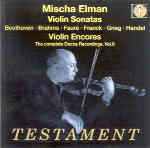Mischa Elman’s prime years in the late teens and early 1920s were overshadowed by the arrival of Jascha Heifetz, who ushered in the modern violin era virtually overnight. The fallout rendered Elman’s late-19th century Russian Romantic style anachronistic. Thus when Elman signed on with Decca in 1954 his reputation was more that of a relic than an icon. Yet time lends perspective, and the recordings he made for the label with pianist Joseph Seiger reveal Elman’s artistry to be quite engaging and serious, his technique up to par and his celebrated tone still huge, resonant, and communicative. There are tiny intonation bobbles in high-lying passages, but not many, and they’re not important.
Don’t expect incendiary splendor or the most incisive bow arm in the Brahms D minor sonata’s intense finale, or in the light-footed scherzos of Fauré’s A major and Beethoven’s “Spring” sonatas, or in the “Kreutzer” sonata’s outer movements. Instead, notice how Elman’s subtle freedom, telling portamentos, and varied articulations never draw attention to themselves (unlike, say, Anne Sophie Mutter’s occasional overphrasing) but rather bring a disarming, storytelling quality to Brahms and Franck’s loftiest ideas. And if we must have old-fashioned Handel, or more tempo changes in the “Spring” sonata’s outer movement than Beethoven indicates, Elman’s natural authority within the style that formed his aesthetic is governed by genuine musical impulse. Perhaps Grieg’s First and Third sonatas find the closest meeting of minds and hearts between composer and violinist, where Seiger’s accompaniments rise above his sensitive yet deferential norm.
Disc 4 consists entirely of the encore-type pieces Elman fans dote upon. He serves them up with generous dollops of style, heart, and soul–and just enough schmaltz! As with Volume 1, Testament’s vivid, lifelike transfers eschew the added reverberation heard throughout Japanese Decca’s out-of-print complete Elman edition, and far surpass the old LP pressings collectors no longer need to horde. Tully Potter’s perceptive, even-handed, and well-researched booklet notes can’t be beat.
































